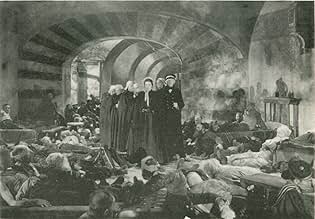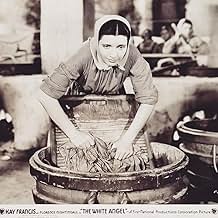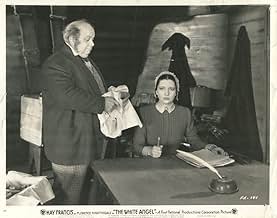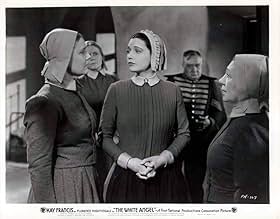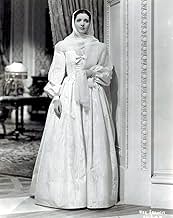VALUTAZIONE IMDb
6,6/10
444
LA TUA VALUTAZIONE
Aggiungi una trama nella tua linguaA look at the life of Florence Nightingale.A look at the life of Florence Nightingale.A look at the life of Florence Nightingale.
- Regia
- Sceneggiatura
- Star
- Premi
- 2 vittorie e 1 candidatura in totale
Lillian Kemble-Cooper
- Parthenope 'Parthe' Nightingale
- (as Lillian Cooper)
Recensioni in evidenza
... in that the only reason I can figure this film is legendary as a bomb is that Kay Francis was not accepted in her role just as Clark Gable was not accepted at the time in Parnell.
Francis was normally the leading lady in sparkling romantic comedies, her most prolific years being the precode ones. She also played the tragic figure in romantic dramas where she might sacrifice to protect a child, or she was misunderstood and believed to be unfaithful and ostracized, or was partnered up with an abusive man. But playing 19th century pioneering nurse Florence Nightingale? This was a complete departure and would be as odd as seeing Errol Flynn play Abraham Lincoln.
Plus Kay doesn't project much genuine emotion during the film. Somebody Florence might have married had she taken the conventional path dies right before her eyes and ... nothing? No tears? Since director Dieterle also directed Paul Muni in The Story of Louis Pasteur the year before, there is no explanation for what happened here.
This film actually didn't bomb, but it was the beginning of the end of Kay at Warner Brothers as her relationship with Jack Warner quickly deteriorated and he realized that Bette Davis was the studio's female star of the present and future.
One thing the film did particularly poorly - All of those intertitles! Some of them are so busy it is like reading a book. Eight years past the transition to sound and this device had been largely abandoned as directors learned to change scenes without it.
This one is worth your time if you forget your preconceived notions about its classification as a bomb and just give it a fair chance.
Francis was normally the leading lady in sparkling romantic comedies, her most prolific years being the precode ones. She also played the tragic figure in romantic dramas where she might sacrifice to protect a child, or she was misunderstood and believed to be unfaithful and ostracized, or was partnered up with an abusive man. But playing 19th century pioneering nurse Florence Nightingale? This was a complete departure and would be as odd as seeing Errol Flynn play Abraham Lincoln.
Plus Kay doesn't project much genuine emotion during the film. Somebody Florence might have married had she taken the conventional path dies right before her eyes and ... nothing? No tears? Since director Dieterle also directed Paul Muni in The Story of Louis Pasteur the year before, there is no explanation for what happened here.
This film actually didn't bomb, but it was the beginning of the end of Kay at Warner Brothers as her relationship with Jack Warner quickly deteriorated and he realized that Bette Davis was the studio's female star of the present and future.
One thing the film did particularly poorly - All of those intertitles! Some of them are so busy it is like reading a book. Eight years past the transition to sound and this device had been largely abandoned as directors learned to change scenes without it.
This one is worth your time if you forget your preconceived notions about its classification as a bomb and just give it a fair chance.
In the grand tradition of biography pictures that sanctify their subjects comes "The White Angel," the "true" story of the lady with the lamp, the nurse who revolutionized nursing, Miss Florence Nightingale. Why does Hollywood insist on sanitizing and sweetening the lives of real people? The most blatant example of this is probably "Private Parts"- the life story of Howard Stern- which turns America's favorite sexually-stunted shock-jock bully into a misunderstood merry prankster, a teddy bear of a man fighting the good fight against prudes and censors. Right.
I caught "The White Angel" on TCM late one evening. It begins with Florence Nightingale- "Flo" to her contemporaries- rejecting tradition and refusing to marry and settle down. She senses a greater purpose and a place for women in military medicine. [In actuality Florence and her sister were encouraged to pursue education by their forward-thinking father.] As played by Kay Francis, Ms. Nightingale is a humorless, passionless saint with absolute confidence in her methods and philosophy. Kay plays the role as if she's riding a heroin high- deeply centered and somewhat removed. With the success of the film riding on this lead performance, we're left with a fascinatingly anti-climactic picture.
There is little if any dramatic conflict in the film- it has all the suspense of a book report. The encounters between Florence and other characters are all laughably wooden. Her antagonists openly profess their resentment of her to her face and she sits stoic, with eyes-wide, accepting the abuse and calmly declaring her intentions to proceed. In one particularly action-less sequence, Florence and her nurses storm the supply tent after the clerk tells them it's closed. "Does the war close at seven?" Florence asks, "Do they stop bringing in the wounded at seven?"
Before the bureaucrat gets the chance to answer, Florence has delicately and glamorously stepped past him, forcing her way inside with the help of the other nurses.
That's the most exciting moment in the movie.
Henry Wadsworth Longfellow stops by to gawk at her heroism and write the poem that would immortalize her. Crusty wounded soldiers smile at her tenderness as she walks the hospital halls at night checking on her patients. I had trouble keeping mine.
The story seems SO glossed-over and tidy (even for a biopic of the 30's) that one can't help but feel cheated by fabricated elements as well as the absence of significant actual events. When Florence arrives at the military hospital a soldier informs her that 57% of all wounded men die even under medical care... the trouble is we're never given an updated number as to a soldier's chance of survival. This is especially ironic due to the fact that a)Florence's Nightingale's arrival and improvement of the military medical system surely improved the survival rate and b) Nightingale herself was famous for her statistical analysis and record-keeping of mortality rates and other social phenomenas. Disappointing.
The film is ultimately a waste; it is predictable and pre-digested, not even diverting enough to hold my attention. Who knew changing the world could be so boring?
Grade: C
I caught "The White Angel" on TCM late one evening. It begins with Florence Nightingale- "Flo" to her contemporaries- rejecting tradition and refusing to marry and settle down. She senses a greater purpose and a place for women in military medicine. [In actuality Florence and her sister were encouraged to pursue education by their forward-thinking father.] As played by Kay Francis, Ms. Nightingale is a humorless, passionless saint with absolute confidence in her methods and philosophy. Kay plays the role as if she's riding a heroin high- deeply centered and somewhat removed. With the success of the film riding on this lead performance, we're left with a fascinatingly anti-climactic picture.
There is little if any dramatic conflict in the film- it has all the suspense of a book report. The encounters between Florence and other characters are all laughably wooden. Her antagonists openly profess their resentment of her to her face and she sits stoic, with eyes-wide, accepting the abuse and calmly declaring her intentions to proceed. In one particularly action-less sequence, Florence and her nurses storm the supply tent after the clerk tells them it's closed. "Does the war close at seven?" Florence asks, "Do they stop bringing in the wounded at seven?"
Before the bureaucrat gets the chance to answer, Florence has delicately and glamorously stepped past him, forcing her way inside with the help of the other nurses.
That's the most exciting moment in the movie.
Henry Wadsworth Longfellow stops by to gawk at her heroism and write the poem that would immortalize her. Crusty wounded soldiers smile at her tenderness as she walks the hospital halls at night checking on her patients. I had trouble keeping mine.
The story seems SO glossed-over and tidy (even for a biopic of the 30's) that one can't help but feel cheated by fabricated elements as well as the absence of significant actual events. When Florence arrives at the military hospital a soldier informs her that 57% of all wounded men die even under medical care... the trouble is we're never given an updated number as to a soldier's chance of survival. This is especially ironic due to the fact that a)Florence's Nightingale's arrival and improvement of the military medical system surely improved the survival rate and b) Nightingale herself was famous for her statistical analysis and record-keeping of mortality rates and other social phenomenas. Disappointing.
The film is ultimately a waste; it is predictable and pre-digested, not even diverting enough to hold my attention. Who knew changing the world could be so boring?
Grade: C
The White Angel which was a film about the crucial years in the life of Florence
Nightingale when she during the Crimean War popularized the career of nursing
for women and sanitary hospitals. Her work in Great Britain and Clara Barton in
the USA during the Civil War set the standards for the nursing profession as we
know it now.
Nightingale came from an upper class background and that probably stood her in good stead because someone who had to worry about how the next month's rent was to be paid or the next meal coming from could not have taken on what she did or faced down the sexist attitudes of her age.
The British cinema did the best version of her life in 1951 with Anna Neagle playing Nightingale. Besides Florence herself the real name of only one other character is used, that of Lord Raglan the Commander of the British forces in the Crimea played here by Halliwell Hobbes. The real players are used in the Neagle film.
This was a change of pace for Kay Francis who usually was more glamorous in her roles than here. Francis reminds me a lot of Rosaland Russell when she did Sister Kenny.
This was part of Warner Brothers biographical films of the late 30s and The White Angel was the only one to have a female subject. The White Angel bogs down a bit in spots and for a more accurate film the Neagle picture is better. Still this is reasonably entertaining and Kay Francis fans will like it.
Nightingale came from an upper class background and that probably stood her in good stead because someone who had to worry about how the next month's rent was to be paid or the next meal coming from could not have taken on what she did or faced down the sexist attitudes of her age.
The British cinema did the best version of her life in 1951 with Anna Neagle playing Nightingale. Besides Florence herself the real name of only one other character is used, that of Lord Raglan the Commander of the British forces in the Crimea played here by Halliwell Hobbes. The real players are used in the Neagle film.
This was a change of pace for Kay Francis who usually was more glamorous in her roles than here. Francis reminds me a lot of Rosaland Russell when she did Sister Kenny.
This was part of Warner Brothers biographical films of the late 30s and The White Angel was the only one to have a female subject. The White Angel bogs down a bit in spots and for a more accurate film the Neagle picture is better. Still this is reasonably entertaining and Kay Francis fans will like it.
William Dieterle, like so many of his contemporaries, left Germany in the 1930's and headed for Tinseltown. He proved himself very adaptable and whilst under contract to Warner Brothers, raised that studio's prestige by directing a series of well-mounted biopics. Invariably set in foreign climes these studio-bound films were all totally convincing in terms of period and place.
This biopic of Florence Nightingale is no exception and although considered the weakest of them all, not least by Dieterle himself, it remains a convincing portrait of Victorian England with its squalor and class-ridden complacency regarding the plight of the lower orders and the general view that nursing was little better than prostitution. It is no less effective when switching to the Crimea and the horrendous conditions that prevailed in the soldiers' hospital at Scutari.
Historically of course it is Hollywood Hokum and full of inaccuracies but it succeeds in its purpose of depicting a truly extraordinary woman and her battle with institutionalised ignorance and prejudice.
Dieterle's customary visual sense is complemented by two stalwarts of Warner Bros, cinematographer Tony Gaudio and the brilliant head of Art Direction, Polish émigré, Anton Grot.
It is generally agreed that the weak link lies in the casting of Kay Francis as Florence. She was at the time Queen of the Lot at Warner Bros and its highest paid star. This, coupled with her innate classiness would make her the obvious choice. She is certainly not lacking in sincerity and it is not her fault that her part has been written more as a symbol than as flesh and blood which alas makes the character rather one-dimensional. Ian Hunter does his best with another one-dimensional role as a reporter for 'The Times' and Donald Crisp excels as the odious Dr. Hunt.
Whatever its shortcomings this version is infinitely more powerful and engaging than that of Herbert Wilcox in 1950 which is little more than a series of tableaux-vivants.
Suffice to say that since her death Miss Nightingale's achievements and far-reaching influence have been overshadowed by suggestions of misogyny, lesbianism and racism! She remains however a Feminist icon despite her observation that although they might crave sympathy "women have no sympathy and my experience of women is almost as large as Europe."
This biopic of Florence Nightingale is no exception and although considered the weakest of them all, not least by Dieterle himself, it remains a convincing portrait of Victorian England with its squalor and class-ridden complacency regarding the plight of the lower orders and the general view that nursing was little better than prostitution. It is no less effective when switching to the Crimea and the horrendous conditions that prevailed in the soldiers' hospital at Scutari.
Historically of course it is Hollywood Hokum and full of inaccuracies but it succeeds in its purpose of depicting a truly extraordinary woman and her battle with institutionalised ignorance and prejudice.
Dieterle's customary visual sense is complemented by two stalwarts of Warner Bros, cinematographer Tony Gaudio and the brilliant head of Art Direction, Polish émigré, Anton Grot.
It is generally agreed that the weak link lies in the casting of Kay Francis as Florence. She was at the time Queen of the Lot at Warner Bros and its highest paid star. This, coupled with her innate classiness would make her the obvious choice. She is certainly not lacking in sincerity and it is not her fault that her part has been written more as a symbol than as flesh and blood which alas makes the character rather one-dimensional. Ian Hunter does his best with another one-dimensional role as a reporter for 'The Times' and Donald Crisp excels as the odious Dr. Hunt.
Whatever its shortcomings this version is infinitely more powerful and engaging than that of Herbert Wilcox in 1950 which is little more than a series of tableaux-vivants.
Suffice to say that since her death Miss Nightingale's achievements and far-reaching influence have been overshadowed by suggestions of misogyny, lesbianism and racism! She remains however a Feminist icon despite her observation that although they might crave sympathy "women have no sympathy and my experience of women is almost as large as Europe."
Kay Francis was cast as Florence Nightingale and the film shows Florence from the time just before she dedicated her life to nursing to just after her return from the Crimean War. Francis' acting and that of most of the supporting actors was good--the dialog and details left a bit to be desired.
Hollywood sure loved bio-pics in the 30s and 40s and churned out gobs of them. The problem, though, is that while many were very entertaining, they also played rather fast and loose with the facts as well as had very, very high "schmaltz" levels on many occasions. In other words, the celebrities being portrayed were very often over-idealized and seemed more like living saints than 3-dimensional heroes. While Florence Nightingale was an absolutely amazing woman and deserved to have a film made about her, all too often the film degenerated into idol worship. My favorite over-the-top moment was when Flo entered the dilapidated hospital and the man ran screaming "water!!!"--what an amazingly unsubtle moment! While the general facts in the film are correct, the way they were realized on screen, at times, made me laugh. This is really a shame, as the real story of this woman should be good enough! As for me, I'd like to see a more realistic and less predictable treatment of her long life.
Hollywood sure loved bio-pics in the 30s and 40s and churned out gobs of them. The problem, though, is that while many were very entertaining, they also played rather fast and loose with the facts as well as had very, very high "schmaltz" levels on many occasions. In other words, the celebrities being portrayed were very often over-idealized and seemed more like living saints than 3-dimensional heroes. While Florence Nightingale was an absolutely amazing woman and deserved to have a film made about her, all too often the film degenerated into idol worship. My favorite over-the-top moment was when Flo entered the dilapidated hospital and the man ran screaming "water!!!"--what an amazingly unsubtle moment! While the general facts in the film are correct, the way they were realized on screen, at times, made me laugh. This is really a shame, as the real story of this woman should be good enough! As for me, I'd like to see a more realistic and less predictable treatment of her long life.
Lo sapevi?
- QuizMuch disagreement to the origin of the source material exists. Some contemporary sources believed the source was Lytton Strachey's 1918 biographical essay in "Eminent Victorians". Others contend Michael Jacoby was the author. Warner Bros. executive Hal B. Wallis contended that the life of Florence Nightingale was in the public domain, and that screenwriter Mordaunt Shairp did his own research. The MPAA agreed with Wallis; no source credit was necessary.
- BlooperWhen Florence is receiving the news on the steps of the hospital of the sinking of the French transport, the shadow of the boom microphone moves onto then quickly off her left sleeve.
- Curiosità sui creditiPrologue: Towards the year 1850, England was at peace with the world. Her men were following her ships to the four corners of the earth, building the great empire that is Queen Victoria's monument. Women were only permitted to nod meek approval. In all England, only Her Majesty had the right to express herself with the independence of a man.
- ConnessioniFeatured in Breakdowns of 1936 (1936)
- Colonne sonoreAuld Lang Syne
(uncredited)
Traditional
Lyrics by Robert Burns
Incorporated into the score at the new year
Sung by the crowd celebrating the new year
I più visti
Accedi per valutare e creare un elenco di titoli salvati per ottenere consigli personalizzati
Dettagli
- Data di uscita
- Paese di origine
- Lingua
- Celebre anche come
- The White Angel
- Luoghi delle riprese
- Aziende produttrici
- Vedi altri crediti dell’azienda su IMDbPro
- Tempo di esecuzione1 ora 32 minuti
- Colore
- Mix di suoni
- Proporzioni
- 1.37 : 1
Contribuisci a questa pagina
Suggerisci una modifica o aggiungi i contenuti mancanti

Divario superiore
By what name was L'angelo bianco (1936) officially released in Canada in English?
Rispondi


